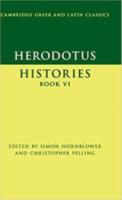
CUP (2017) p/b 342pp £24.99 (ISBN 9781107609419)
This edition is one of a pair with H.’s 2013 edition of Book 5 ‘because we regard Books 5 and 6, and therefore also the commentaries on them, as a continuum’. The second half of the Histories, as is well known, is more historical and less ethnographic than books 1-4, and the narrative of the Ionian revolt and the Marathon campaign marks the change of emphasis, dominating this section of the work and spanning Books 5-6, though, as H/P. point out, it is generally held that the book divisions were made later than Herodotus himself. H.’s introduction to Book 5 (2013) treated a number of topics in common with Book 6 which are not repeated (structure, Books 5-6 in relation to the entire work, personal names, kinship ties). Some topics (Kleomenes, Aigina, Homer) promised in the earlier edition now appear in the introduction, though not all in dedicated sections. That on ‘Kleomenes and Impiety’ starts from Kleomenes (‘one of the most strongly characterised individuals’) and also includes examples of impiety such as Persian ‘burn-in-return’ policy, or the story of Glaucus the would-be cheat, or the death of Miltiades from the wound sustained when he was attempting to leave the sanctuary of Demeter on Paros. Discussion of sources is confined to the notes. Elsewhere in their introduction H/P explore the afterlife of Marathon, examining the commemoration of the dead, the way in which the name became so evocative of the Persian Wars, its importance to Athens (fighting on their own, though not), and there are glances at some famous later judgements such as J.S. Mill’s remark that its importance eclipsed that of Hastings for British history or Robert Graves’ ‘trivial skirmish’.
The text is accompanied by a brief apparatus criticus. The spelling Philippides is justified briefly by the similarity of capital lambda and delta in MSS, the spelling in other authors (e.g. Plutarch On Herodotus’ Malice 862) and the possible influence of Pheidippides from Clouds. At the end of the Introduction a very short discussion of the text focuses on double accentuation preceding σφεας and on incorporated drafts. These are given fuller treatment in the notes. At 121.2-123.1, for instance, on the possible interpolation about Callias (Kallies in H.’s transcription), including his success in equestrian competitions and his three daughters, H/P scrutinize not only the use of language but also the relation of the excursus to relevant themes which might justify the inclusion, such as the ability to enjoy prosperity under tyranny even by tyrant haters. H/P ‘accept the view … that the interpolator was no interpolator’ but Herodotus still working on the material sometime later.
There is also a brief section by A.M. Bowie in the introduction that offers a guide to Herodotus’ language and dialect. This is reprinted from Bowie’s edition of Book 8 and H.’s edition of Book 5. The editors all keep an initial rough breathing in keeping with modern practice, despite being contrary to East Ionic and labelled by Enoch Powell as ‘a venerable absurdity’.
The notes are entirely appropriate for the series, although H/P would have liked a larger format to allow more reference to modern scholarship. Help with translation is generous: many words or phrases are simply glossed to help the reader with unusual meanings, many others are accompanied by discussion, some briefly (ταραχή ‘stasis perhaps’, 5.1), some at greater length (εὖ ποιήσας φανήτω ‘make it clear that he has benefitted [sic] the king’s house’ is followed by observation of the difference between the participle and infinitive with φαίνομαι, 9.3). Historical commentary is abundant as one would expect from H/P. Introductions to various sections help the reader through the labyrinth of Herodotus’ narrative and offer slightly longer discussion of various issues to be encountered in the text.
In short this volume is an excellent contribution to the Cambridge ‘Greek and Roman Classics’ series and should make Herodotus Book 6 a more accessible text for future readers.
Alan Beale
